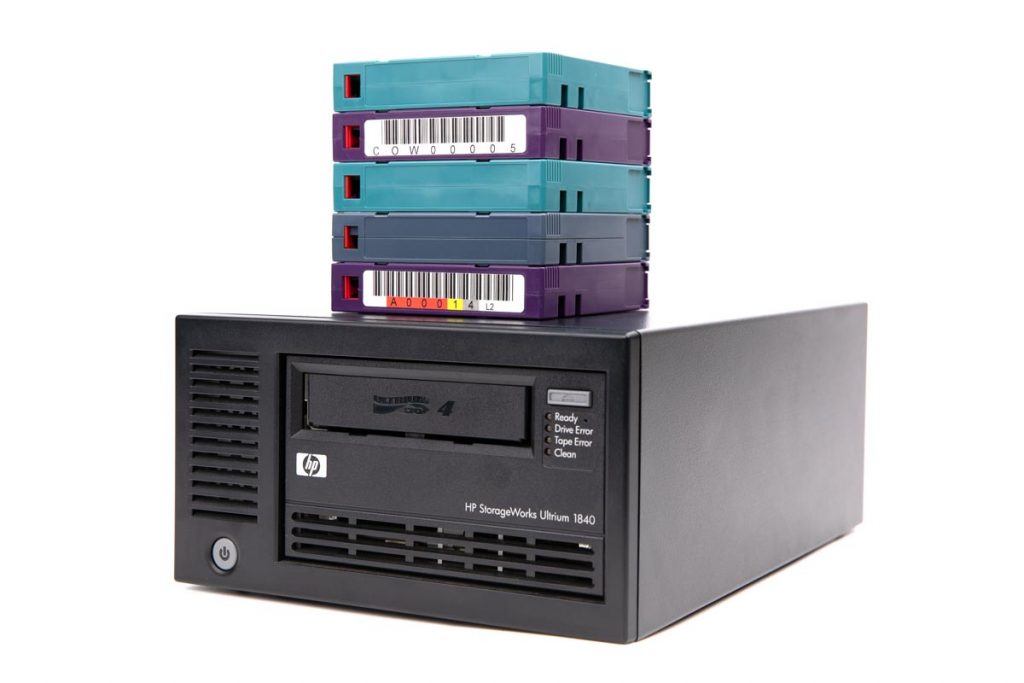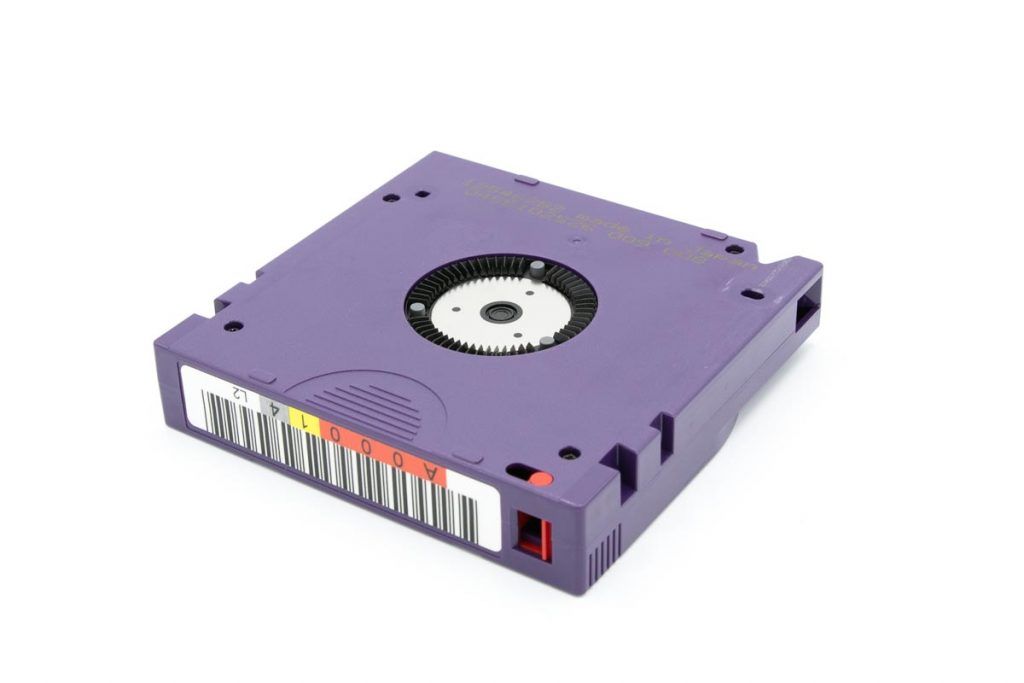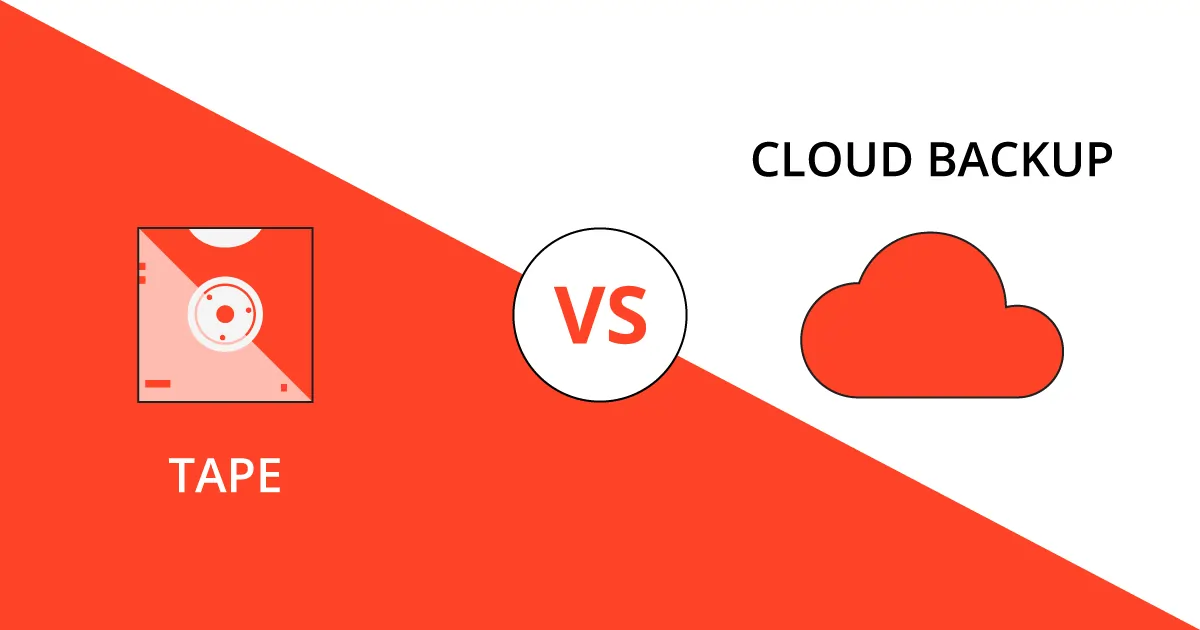Tape Backups versus Cloud-Based Backups – these strategies often depend on budget limitations, data recovery speed, storage capacity, and desired security level. Each approach has advantages and disadvantages, making it suitable for different organizations and situations. This document aims to examine these methods, providing a thorough comparison to assist decision-makers in choosing the most optimal backup strategy for their particular requirements.
What is Tape backups
Tape backups are a data storage method that involves recording digital data on magnetic tape. Tape backups are both economical and durable. Regarding their functionality, they operate by transferring data from a main storage device to a tape cartridge according to a pre-established timetable.
Storing these cartridges offsite protects against data failure caused by disasters or cyber threats. Tape backup storage provides affordable, secure, long-term data preservation, making it an attractive solution for businesses maintaining historical archives.
Tape Backup Advantages and Disadvantages
Understanding the advantages and disadvantages of tape backup is crucial in recognizing its value to an organization. Despite advancements in storage capacity, the fundamental process remains unchanged. It operates like a VHS videotape, storing information on the tape for long-term preservation. Unlike conventional hard drives, tape backups do not generate heat or experience typical drive failures.
Tape Backup Advantages
- It offers an economical solution for storing vast amounts of data over extended periods.
- It is exceptionally durable and long-lasting, with an impressive lifespan of up to 30 years.
- Offline access provides greater security against online threats.

Tape Backup Disadvantages
- Traditional backups, in contrast to cloud-based backups, tend to have slower retrieval speeds because of the limitations of physical storage systems.
- Moreover, conventional backups are more vulnerable to damage or deterioration over time since they depend on physical media, which environmental conditions and wear-and-tear can impact.
However, one significant disadvantage of tape backups is the need for a tape drive for backup operations, which can be expensive, especially considering the cost of the replacement parts, and require manual handling to load and unload tapes, thereby introducing a risk factor of human error.
What is Cloud-based Backup
Cloud-based backup is a data security and recovery process that involves replicating, storing, and retrieving digital data to an offsite online location. Unlike tape backups, CBU leverages web-based technology instead of physical media to store data in the cloud, eliminating the need for costly hardware installations.
This approach offers faster data transfer speeds, improved scalability, and more options for automation of backup processes. Moreover, cloud-based backups provide greater accessibility to data from multiple locations, enabling businesses to recover swiftly from disasters or targeted cyber breaches.
Cloud-Based Backup Advantages and Disadvantages
Cloud storage provides convenient access to information from any location with an internet connection. It offers the ultimate benefit of cloud storage. Whether you frequently travel or enjoy the flexibility of working from home, cloud storage is an ideal solution. The speed is remarkable, as long as you have a reliable internet connection. Ultimately, it depends on the robustness of your Wi-Fi.

Advantages
- Experience lightning-fast data transfer and retrieval speeds, ensuring seamless file access.
- Experience seamless scalability with our system, enabling you to expand storage space without requiring hardware installations.
- Utilize our automation options to optimize backup processes, saving valuable time and ensuring utmost efficiency.
Disadvantages
- The cost of using tape backups for large amounts of data may be higher than traditional methods.
- While it is true that cloud-based backup solutions rely on internet connectivity, it is important to note that technological advancements have significantly minimised network downtime’s impact.
Tape Backups vs Cloud-Based Backups -Difference
While tape and cloud-based backups serve the purpose of data preservation and disaster recovery, they offer distinct features that cater to different needs.
Now that we have explored the details and characteristics of tape backups and cloud-based backups, it is essential to highlight their differences for a better understanding. Here are some key contrasts between these two backup strategies:
| Features | Tape Backups | Cloud-Based Backups |
|---|---|---|
| Cost | More cost-effective for large volumes of data | Higher costs for large data volumes |
| Speed | Slow data retrieval speeds | High-speed data retrieval and rapid transfer rates |
| Scalability | Constrained by the limitations of physical storage capacity. | Can be effortlessly expanded to accommodate growing digital storage requirements. |
| Data Integrity | Prone to physical damage and degradation | Data is stored in an external location, reducing the likelihood of physical harm. |
| Security | Provides strong security due to offline storage | Dependent on the internet and therefore susceptible to online security risks. |
| Accessibility | Requires physical manipulation for data access | Accessible from anywhere with an internet connection. |
| Dependability | Regular testing and maintenance required for data integrity | Automated procedures ensure consistent data backup and retrieval as needed. |
Preventing Data Loss from Tape
With tape backups, data loss can occur due to human error or hardware malfunction. To prevent this, it’s essential to regularly test and validate the integrity of your tape backup systems. It involves routine checks on system components like drivers, media tapes, and backup software. Additionally, keeping tapes in a controlled environment with proper temperature and humidity ensures their longevity and durability.
In the unfortunate event of data loss from your tape devices, seeking professional assistance is crucial. Attempting to retrieve the data alone can cause further damage or even permanent data loss. PITS Global Data Recovery Services is a true solution for such situations. Our service can handle tape data loss with our knowledge and expertise, ensuring a safe and effective recovery process. We ensure emergency services to help you retrieve your valuable data as swiftly as possible. Our experienced professionals are committed to supplying you with the best possible outcome.
Frequently Asked Questions
What is the main drawback of tape storage as a backup?
Compared to traditional backup solutions like cloud storage, accessing and recovering data from tapes can be lengthy. Moreover, there is a risk of physical damage or degradation over time, jeopardizing the integrity of the data. Lastly, the management and storage of tapes necessitate a physical space and controlled environment, which can pose challenges for certain businesses.
What are the pros of tape backups?
Tape backups provide an affordable option for long-term data preservation, especially when dealing large amounts of data. They offer a strong level of security since they can be stored offline, minimizing the vulnerability to online dangers like cyberattacks.
What is the best backup tape strategy?
An effective backup tape strategy requires a well-organized and consistent schedule for data backup, often using a rotation scheme such as Grandfather-Father-Son (GFS). Additionally, it is important to store the tapes securely in a controlled environment to prevent physical deterioration. Finally, regularly testing and validating the data integrity on the tapes ensures their dependability and
Is it better to backup on a tape or disk?
When choosing between tape and disk backup, the decision largely relies on your organization’s requirements. Tape backups are an economical option for securely storing large amounts of data offline over an extended period. They offer protection against cyber threats. On the other hand, disk backups provide faster data retrieval and are advantageous for businesses needing frequent backup data access.
What is the difference between cloud backup and cloud storage?
While they have a similar idea, cloud storage and backup serve different purposes. Cloud storage offers individuals an internet-based platform for storing and retrieving data, such as Google Drive or Dropbox. On the other hand, cloud backup is a service that automatically copies and stores files and data offsite, ensuring their preservation in case of hardware failure, data corruption, or any form of data loss.
